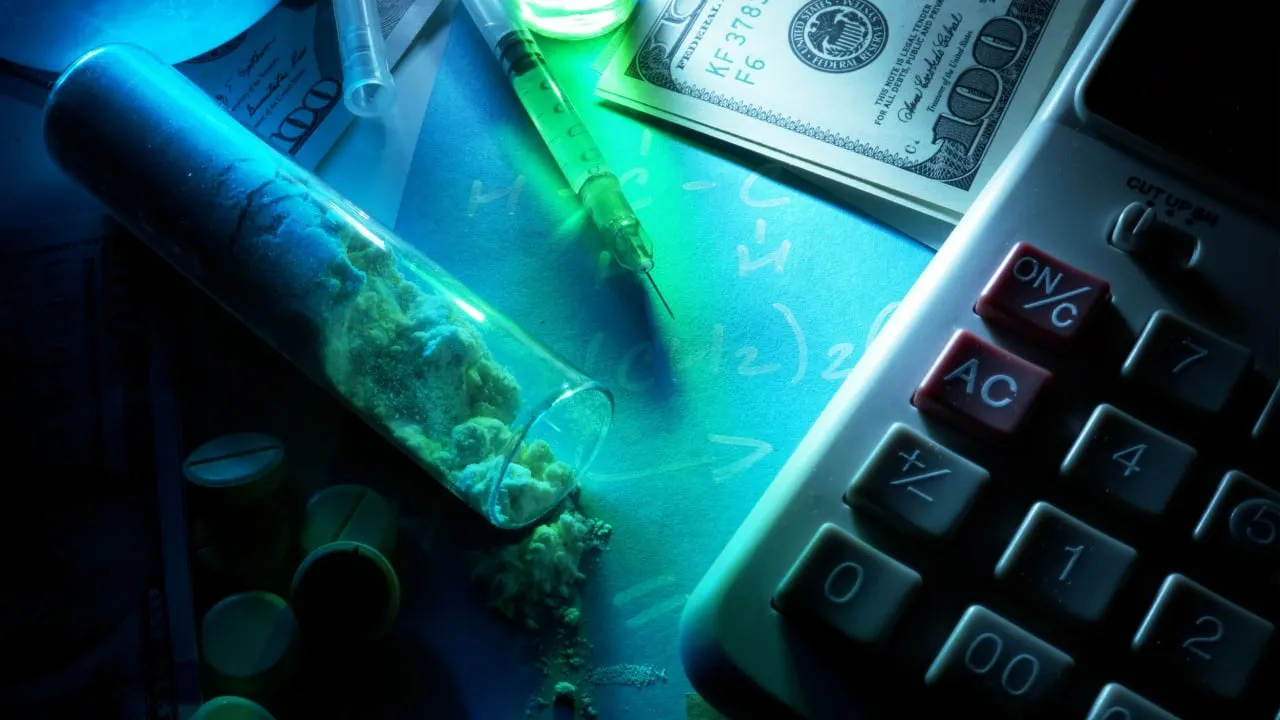Justice Department Announces Eight Indictments Against China-Based Chemical Manufacturing Companies and Employeeshttps://t.co/f37okHaa6z
— Justice Department (@TheJusticeDept) October 3, 2023
Coin Prices
BTC
$68,724.00
3.66%ETH
$2,025.51
2.79%BNB
$637.30
2.48%XRP
$1.39
2.19%USDC
$0.999904
-0.00%SOL
$87.12
3.89%TRX
$0.282361
0.39%DOGE
$0.095213
2.88%FIGR_HELOC
$1.035
0.59%WBT
$50.06
2.21%ADA
$0.279783
1.60%USDS
$1.00
0.01%BCH
$444.22
1.36%LEO
$9.03
-0.56%HYPE
$32.25
1.76%XMR
$347.25
1.77%LINK
$8.99
2.33%CC
$0.158404
-3.15%USDE
$0.999315
0.04%XLM
$0.157878
1.57%USD1
$0.999958
0.01%RAIN
$0.00916367
0.29%HBAR
$0.099665
1.90%LTC
$54.53
1.86%PYUSD
$0.999828
0.02%AVAX
$9.22
2.21%SUI
$0.931785
4.71%ZEC
$218.63
0.15%SHIB
$0.00000563
1.40%CRO
$0.075956
0.88%TON
$1.23
1.18%WLFI
$0.108674
0.55%XAUT
$5,290.86
-0.93%M
$1.50
0.95%PAXG
$5,341.48
-1.23%DOT
$1.53
0.12%UNI
$3.91
3.86%MNT
$0.64352
0.67%BUIDL
$1.00
0.00%USYC
$1.12
0.01%AAVE
$123.81
8.76%TAO
$186.56
5.09%USDG
$0.999957
-0.00%USDF
$0.997298
0.08%ASTER
$0.692858
-2.27%NEAR
$1.32
15.41%SKY
$0.070782
5.47%OKB
$77.10
1.37%PI
$0.169196
0.77%RLUSD
$0.999668
-0.00%PEPE
$0.00000357
2.68%BGB
$2.15
0.18%HTX
$0.00000159
4.70%ETC
$8.82
3.49%ICP
$2.42
0.66%BFUSD
$0.999207
0.01%ONDO
$0.26092
2.28%WLD
$0.414568
7.22%PUMP
$0.00198587
2.97%USTB
$11.00
0.01%GT
$6.99
0.74%POL
$0.10187
-2.74%MORPHO
$1.91
10.94%KCS
$7.71
1.40%NIGHT
$0.059799
4.09%ENA
$0.113989
9.31%QNT
$63.74
1.85%USDY
$1.12
-0.06%ATOM
$1.85
3.07%HASH
$0.0165909
-2.35%NEXO
$0.865681
0.52%USDTB
$1.001
0.06%KAS
$0.03021269
2.33%TRUMP
$3.48
1.38%EUTBL
$1.23
-0.61%FLR
$0.00937118
0.96%ALGO
$0.088667
3.18%APT
$0.964802
3.95%OUSG
$114.44
0.00%FIL
$0.992703
2.71%JAAA
$1.027
-0.05%USDD
$1.00
-0.01%RENDER
$1.38
2.27%XDC
$0.03314115
1.97%STABLE
$0.03210118
-1.34%VET
$0.00734362
2.77%JUP
$0.177989
8.26%ARB
$0.103485
4.46%BDX
$0.079795
-1.04%YLDS
$0.999991
-0.00%JTRSY
$1.096
0.03%USD0
$0.995838
-0.20%PIPPIN
$0.548954
-6.65%BONK
$0.0000061
4.08%GHO
$1.001
0.07%DCR
$30.48
2.10%VIRTUAL
$0.775464
11.50%A7A5
$0.01274226
-0.60%TUSD
$1.00
0.20%STX
$0.257886
1.06%FTN
$1.089
-0.06%SEI
$0.06925
1.13%EURC
$1.17
-0.84%USDAI
$0.999652
-0.04%PENGU
$0.00719658
7.06%CAKE
$1.35
3.07%DASH
$34.67
8.00%JST
$0.048121
1.29%KITE
$0.234437
-9.51%KAU
$171.08
-7.59%XTZ
$0.377686
1.52%POWER
$1.82
-3.10%ETHFI
$0.510847
2.80%ZRO
$1.85
5.78%CRV
$0.253338
4.52%FDUSD
$0.999778
-0.09%CTM
$0.084023
2.60%CHZ
$0.03479657
4.72%USX
$0.999797
0.00%VVV
$7.92
33.57%GNO
$132.71
3.98%LIT
$1.38
0.69%FET
$0.151788
-0.04%BTT
$0.00000034
0.96%PRIME
$1.019
0.06%NFT
$0.00000033
0.04%KAIA
$0.055125
1.05%AERO
$0.348275
0.54%ADI
$3.29
-2.11%SPX
$0.336624
3.79%INJ
$3.12
3.08%BSV
$15.29
0.18%SUN
$0.01584055
4.45%SIREN
$0.417279
57.45%IP
$0.86015
-2.24%TIA
$0.33371
5.06%IOTA
$0.067866
2.27%CRVUSD
$0.999658
0.12%PYTH
$0.050105
3.47%GRT
$0.02614785
2.02%FLOKI
$0.00002857
4.03%RIVER
$14.12
1.84%SYRUP
$0.238223
2.27%FRAX
$0.994704
0.44%OHM
$17.43
1.75%JASMY
$0.00551723
1.58%OP
$0.126278
3.69%LDO
$0.310038
3.15%2Z
$0.075285
2.72%BTSE
$1.60
2.56%CFX
$0.0490963
3.37%TEL
$0.00265142
3.43%HNT
$1.30
1.90%AB
$0.00242829
1.06%UDS
$1.89
4.03%ENS
$6.15
2.25%LUNC
$0.00004278
-1.29%MON
$0.02139887
0.82%XPL
$0.103075
5.20%SAND
$0.086035
3.82%STRK
$0.0414305
2.85%NUSD
$0.999516
0.04%H
$0.124058
-0.42%BARD
$0.99817
0.55%PENDLE
$1.31
3.53%USDA
$0.984022
0.00%AXS
$1.28
0.12%AUSD
$0.999926
0.01%USTBL
$1.076
0.04%APEPE
$0.00000101
0.62%BCAP
$22.79
0.00%TWT
$0.491632
0.33%WIF
$0.201933
5.37%ZBCN
$0.00204677
1.89%THETA
$0.193889
3.22%FT
$0.09798
-0.24%B
$0.193235
2.04%MANA
$0.098914
3.48%BORG
$0.193635
1.11%VSN
$0.052914
0.37%PC0000031
$1.00
0.00%NEO
$2.66
1.60%ULTIMA
$4,952.90
-1.34%FF
$0.079556
1.04%WAL
$0.080155
5.13%FDIT
$1.00
0.00%XCN
$0.00474772
1.14%ZK
$0.01898806
1.54%COMP
$17.92
1.24%FLUID
$2.21
3.21%REAL
$0.054928
3.74%IUSD
$1.00
0.10%9BIT
$0.02096404
3.87%GALA
$0.00359049
2.48%GRASS
$0.311903
24.31%TIBBIR
$0.168739
4.01%MX
$1.81
0.36%CVX
$1.78
2.66%WFI
$2.02
-3.00%RAY
$0.604775
2.43%KOGE
$48.00
0.00%FARTCOIN
$0.162143
5.65%DEXE
$3.46
3.49%SATUSD
$0.995004
-0.09%BAT
$0.105309
2.46%EURS
$1.25
-1.16%S
$0.04085935
3.09%SENT
$0.02116657
0.20%GUSD
$0.996511
0.66%XEC
$0.00000731
3.32%TRAC
$0.319669
0.60%RUNE
$0.407129
2.54%USDF
$0.998385
-0.03%COCO
$0.1414
2.98%IMX
$0.165859
3.22%BERA
$0.607904
1.08%SFP
$0.277238
5.36%THBILL
$1.014
-0.02%GLM
$0.135338
1.06%0G
$0.628699
0.51%1INCH
$0.095171
3.19%RLB
$0.075816
1.22%EGLD
$4.47
2.25%ACRED
$1,096.46
-0.00%WEMIX
$0.283467
-0.38%A
$0.080257
1.99%ROBO
$0.058022
51.52%SKR
$0.02187009
-2.42%JTO
$0.279985
5.63%KTA
$0.250376
2.22%OZO
$0.130529
0.03%MWC
$11.25
2.01%LION
$0.0039812
1.01%COW
$0.218514
3.49%AMP
$0.00144465
1.00%GOMINING
$0.300627
-1.12%PUSD
$1.001
0.00%USR
$0.999521
0.04%EIGEN
$0.186019
4.00%ONYC
$1.081
0.09%LPT
$2.35
1.92%FRXUSD
$1.00
0.03%AVUSD
$0.999433
-0.04%REUSD
$1.064
0.08%ATH
$0.00638914
1.39%SNX
$0.320704
2.33%FORM
$0.287025
34.13%BMX
$0.319584
0.83%
